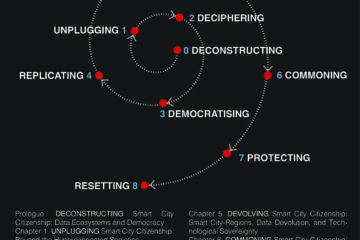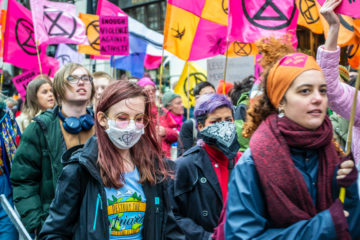
Smart City Citizenship: A Techno-Political Review (of Cities and Nations)
COVID-19 has hit European citizens dramatically, not only creating a general risk-driven environment with a wide array of economic vulnerabilities but also exposing them to pervasive digital risks, such as biosurveillance, misinformation, and e-democracy algorithmic threats. Over the course of the pandemic, a debate has emerged about the appropriate techno-political response when governments use disease surveillance technologies to tackle the spread of COVID-19. Citizens have pointed out the dichotomy between state-Leviathan cybercontrol and civil liberties. Moreover, the giant technological flagship firms of surveillance capitalism, such as Google, Amazon, and Facebook, have already assumed many functions previously associated with the nation-state, from cartography to the disease surveillance of citizens. But particularly, amidst the AI-driven algorithmic disruption and surveillance capitalism, Smart City Citizenship sheds light on the way citizens …
Covid-19 and Prison Populations: the case for priority vaccine allocation
As we enter 2021 and the Covid-19 pandemic rumbles on, optimism for the coming year relies heavily on successful vaccine rollout. Attention is now increasingly focussed on the practicalities of distribution, which will involve prioritisation and difficult policy decisions. Few argue about those groups right at the top of the list like care home residents, or healthcare staff working in high risk settings. However, an important population is less on the radar: people in prison. There are around 11 million people in prison around the world. Most will be in environments that make social distancing and other measures to reduce transmission, now a routine part of day-to-day community life for most, much more challenging. Such conditions can make prisons vulnerable …
Biden, López Obrador and the politics of migration: a return to the status quo?
Joe Biden’s presidential victory has brought temporary relief for many undocumented and mixed-status families in the US. Biden promised to reverse several of Trump’s executive orders on immigration and refugee policy within his first 100 days in office including reinstating the Deferred Action for Childhood Arrivals (DACA) program, ending the Migrant Protection Protocols (MPP) also known as “Remain in Mexico,” and creating a “road map” to citizenship for the approximate 10.5 million undocumented immigrants in the US. While Biden’s immigration agenda contains federal and local level priorities, little emphasis has yet been placed on the bilateral scale with the US’s southern neighbour, Mexico. Yet, bilateral immigration negotiations should be a priority for administrations on both sides of the border. In …
Italy’s Other Wave: Protests during the Second Lockdown
Italy was the first Western democracy to impose a country-wide lockdown in response to the COVID-19 pandemic. Despite successfully curbing the number of infections in the first half of 2020, Italy saw its cases increase again in October, prompting Prime Minister Giuseppe Conte and local governments to announce new restrictions to curb the cresting second wave. Despite the clear memory of the significant death toll and warnings of the dangerous winter to come, however, these announcements have been met with opposition. On the evening of the 23rd October, thousands gathered in the streets of Naples to protest against the forced closure of shops and restaurants and the threat of a local lockdown. A group of about 300 people—including youth, extremist political groups, and football hooligans—escalated into a violent protest, attacking police officers, burning cars, and vandalizing private …
Mongolia’s Debt Overhang Amidst a Pandemic
As the economic effects of the COVID-19 pandemic unfold, the most severe casualties of “The Great Lockdown” are resource-dependent economies with limited institutional capacity to respond to the crisis. Their supply chains have been cut off, their markets are disrupted, and their investors are crowding out. Many of these countries have high external debt and an obligation to repay it in the medium term or they will face the trilemma of registering a double-digit growth, accruing further debt, or defaulting. Come 2021, Mongolia, a superlatively resource-dependent economy, will be at the center of this trilemma. The immediate cause of Mongolia’s current state is its inconsistent fiscal expenditure and its undiversified mining economy. Over the years, fiscal mismanagement of the previous …

Lockdown and the Climate Crisis
In 2020, lockdowns around the world have reduced energy use and carbon emissions on an unprecedented scale. However, the current COVID-19 outbreak may be a double-edged sword in the fight against climate change. Individual countries are imminently due to report their carbon reductions, as outlined in the United Nations-brokered Paris Agreement. Although pre-Coronavirus crisis global greenhouse gas (GHG) emissions are expected have grown by 1.9%, recent CO₂ calculations in Europe are predicting a surprising scenario: countries may actually hit their stated reduction goals. For instance, the German climate target for 2020, which until February was considered unattainable, should now be met. Due to this year’s mild winter, and, above all, the Coronavirus crisis, the target of 40% CO₂ savings—unlike climate change targets …

